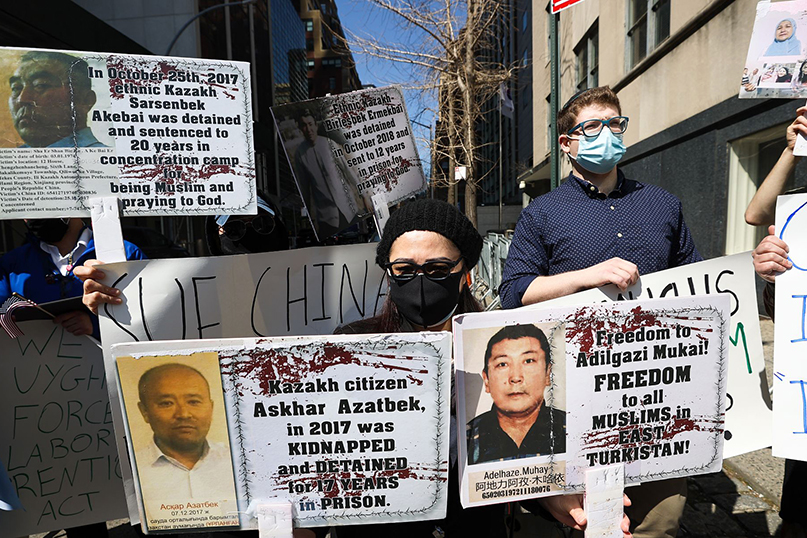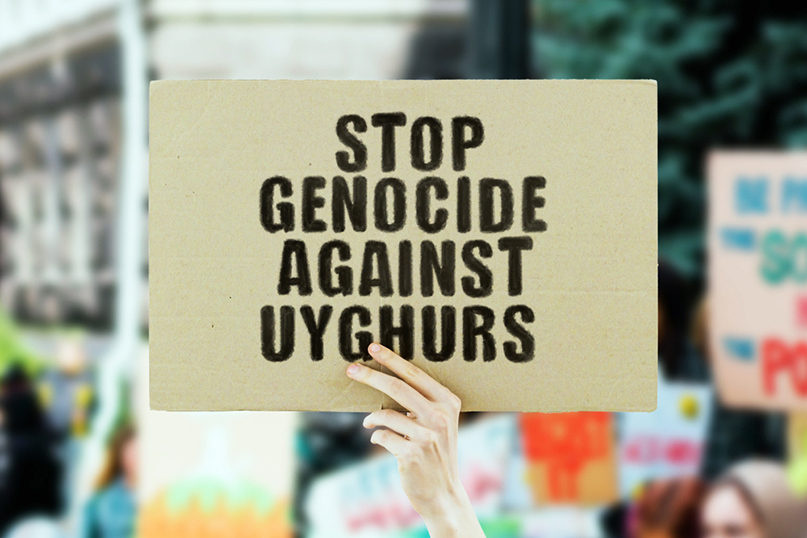
By Ron Kampeas
(JTA) – When Rayhan Asat attended a Passover seder last month, its contours seemed familiar and different at once – especially the tradition of leaving a seat empty at the table.
It reminded Asat, a lawyer, of leaving a seat empty for her brother, Ekpar, at her graduation from Harvard Law School in 2016. Ekpar, a member of China’s Uighur minority, had been disappeared by the Chinese government.
Jewish World Watch, an anti-genocide group that hosted the online seder for Uighurs on March 30, suggested that families leave a seat at the seder table for the more than a million people whom China’s government has imprisoned or otherwise disappeared.
“As a sister of an imprisoned victim of China’s anti-Uighur campaign, Ekpar Asat, I’m grateful a seat has been reserved for him on this Passover,” Asat said as she participated in the recitation of the plagues. “This seat is very different than Ekpar’s seat that remained empty at my Harvard graduation.”
In an interview a couple of days later, Asat told the Jewish Telegraphic Agency that her first encounter with Jews was when she befriended Jewish students at Harvard. She quickly realized that they would be compassionate allies in the struggle of her Muslim ethnic minority.
“Other people, you know, they might ask questions like, ‘Oh why did they put him in the camp?’ or ‘How did this happen?’” Asat said. “And what is so assuring was the level of compassion and understanding that comes from the Jewish community because of the history and the community’s deep understanding of how these things do happen, and I don’t have to explain it to them.”
One of the friends Asat made at Harvard, Amy Woolfson, has become a leading campaigner for the Uighurs in her native England, where British Jews have emerged as leading champions for the Uighur cause.
Now Jewish organizers in the United States are hoping to galvanize American Jews in the same way through a major Jewish advocacy campaign on a par with the Save Darfur campaign of the 2000s. That campaign helped bring about a peace process that culminated last year in an agreement between Sudan and the Darfur rebel groups. Many Jewish groups have already issued statements and taken policy positions as an early step, and a community effort in Indianapolis is emerging as a local model.
But even as they ramp up their activity on the issue, the organizers say they recognize that going up against China is potentially a more fraught endeavor for American Jews.
“Anytime that one deals with a government that has an important relationship with Israel and with the United States, one needs to weigh the pluses and minuses of criticism,” said Jason Isaacson, the chief policy and political affairs officer for the American Jewish Committee. “There are times when the demands of conscience require kind of a reassessment of that balance, but we have never wanted to behave in a way that would prevent continued contact for mutual interest.”
In recent months, attention to the Uighur cause has deepened, with new reports about how China’s government has interned members of the Turkic Muslim minority in “reeducation” camps. The government said the move is meant to combat terrorism. Reports, denied by the government, say the captive Uighurs are pressured to abandon their culture and have been forced into labor, and that women have been sterilized.
The Trump administration designated the atrocities against the Uighur a genocide, and in a rare foreign policy consistency across administrations, President Joe Biden has embraced the term as well.

“It clearly has deep resonance to Jewish history,” said Rabbi David Saperstein, who led the Jewish campaign for Darfur when he helmed the Reform movement’s Religious Action Center. “It has evoked a response.
“There are a number of grassroots groups around the country that have mobilized around Uighur issues, a number of national groups have taken policy positions on it, and speak out on it, including the [Union for Reform Judaism] and the American Jewish Committee and others,” said Saperstein, who participated in the online seder and is now a senior adviser to the Religious Action Center.
Other major Jewish groups involved in Uighur activism include the Conservative movement’s Rabbinical Assembly, the Anti-Defamation League and the Conference of Presidents of Major American Jewish Organizations.
So far it hasn’t translated into widespread action like that generated by the Darfur issue, when teens donated their bar and bat mitzvah money to the cause. Serena Oberstein, the Jewish World Watch executive director who is at the nexus of the emerging campaign, identified a number of factors to explain why the rollout has yet to achieve the intensity of the Jewish Darfur activism 15 years ago.
Oberstein named the difficulties of direct action during the pandemic, and China’s world preeminence – compared to Sudan’s relative powerlessness – and how that can inhibit Jewish action.
“I think that because of how integral China is to the world’s economy, people really want to support in theory, and so it’s a matter of taking it beyond just words and turning it into deeds, getting corporations to end partnerships to pull their labor force out,” she said.
That effort gets sensitive when a Jewish organization is partnered with a corporation that does business in China, or when board members of an organization do business in China, Oberstein said.
“I’ve heard from a number of people who have said things like, ‘I want to be supportive, but my business has a headquarters in Shanghai,’” she said. “They work in the private sector and they don’t want to be pushed out of the Shanghai market. And so that is something that is really hard to hear.”
Another factor, Oberstein said, is the trepidation about validating boycotts (although Uighur activists and their allies are not yet calling for boycotts) at a time that the mainstream Jewish community is trying to face down calls from the left to boycott Israel.
Isaacson acknowledged the risks of taking on a major power, particularly for an organization like his. The American Jewish Committee fashions itself as the Jewish community’s diplomatic arm. But the persecution of the Uighurs are so acute, he said, it necessitated some form of action.
“You also recognize that we’re an organization that has a long-standing relationship with China, we have an Asia Pacific Institute that has maintained a high level of contact in Beijing and through consulates and the embassy and the U.N. mission in New York,” he said. “So we take our diplomatic contact very seriously and we recognize that this is a government that we want to remain in contact with, but terrible abuses are being committed and they need to be addressed.”
A number of the Jewish groups now speaking out on the Uighur issue have already been advocating for the Rohingya, the Muslim minority facing the depredations of a government ethnic-cleansing campaign in Myanmar.
They are also looking to Europe, where the Jewish campaign for the Uighurs is more advanced. In England, students have taken the lead in advocacy, and have recruited to their cause the British chief rabbi, Ephraim Mirvis, who rarely involves himself in political issues.
A trigger in Europe for activism is the concentration in that continent of fashion designers, who import Chinese cotton. About a fifth of the world’s cotton is produced in the Xinjiang region, where the Uighurs are indigenous. Human rights groups say forced Uighur labor is being used to produce cotton. The United States banned cotton from Xinjiang earlier this year.
Among its actions, the American Jewish Committee welcomed the Trump administration designation last year of the anti-Uighur persecution as a genocide, and it backs legislation under consideration in Congress that would ban the entry into the United States of goods believed to be manufactured in Uighur labor camps, and that would elevate the refugee status of Uighurs.
The two pieces of legislation, with bipartisan support, have become the focus of Jewish community lobbying. Rep. Ted Deutch, a Jewish Democrat from Florida, is a lead sponsor of the refugee bill, which would reclassify Uighur refugees for more immediate access to U.S. resettlement. He told JTA that his Jewish involvement was a leading factor in advancing the bill.
“Jewish communities have lived in countries with antagonistic rulers where we’ve been forced into ghettos,” he said. “We’ve been used as scapegoats for issues within countries, there have been efforts to force us to give up our traditions, made to convert under the threat of death.”
At this stage, national action is focusing on educating Jewish communities, said Tammy Gilden, the associate director for policy at the Jewish Council for Public Affairs, or JCPA, the umbrella body for national and regional community relations groups. But that will transition soon to activism.
A webinar for constituent groups in January that included Asat sparked enough interest for a repeat last week, and the JCPA is shaping a resolution to guide further action.
“We received this deluge of requests for a more public lengthy or more in-depth conversation on the issue,” she said.
Leading the more recent JCPA webinar was the Indianapolis Jewish Community Relations Council, which is already active in advocating for Uighurs, in part because Indiana Sen. Todd Young, a Republican, has previously sponsored legislation tackling genocide issues. Young is sponsoring the Senate version of the legislation that would ban the entry of goods made in the Uighur detention camps.
Amber Maze, the Indianapolis JCRC’s Holocaust educator, said the strategy is to get lawmakers like Young who are already engaged on the Uighur issue to pressure their peers to sign on.
“We are hoping at the Indianapolis JCRC to become a model for other JCRCs across the nation on how they can really engage in the genocide prevention mass atrocity prevention,” she said.
Aaron Welcher, the Indianapolis JCRC’s communications associate, said one aim was to persuade other Jewish communities that genocide was not too big an issue for grassroots group to tackle.
“Genocide and mass atrocities does seem like such a big issue that people don’t want to engage in it, but we have formed the opposite opinion that actually it’s at the local level that a lot of change is made,” he said.
China’s government is acutely aware of the potency of grassroots activism. Samuel Chu, an American activist who targets China’s crackdown on Hong Kong, warned participants in the most recent JCPA panel that they could face legal consequences: Last year, China issued an arrest warrant for Chu, who is a U.S. citizen and not a citizen of China, a first. Such warrants could inhibit travel for activists.
Rabbi Lee Paskind, the social justice commission chairman at the Rabbinical Assembly, said the group was encouraging constituent synagogues to take action locally.
“It’s really gaining traction – a lot,” he said.
OPINION: Why aren’t Jews up in arms about Uyghur genocide?
By Jonathan S. Tobin
(JNS) In the spring of 2006, thousands of Jews descended on Washington for a protest about an ongoing genocide going on in a western province of Sudan. Only days after the Jewish community had commemorated Yom Hashoah, the same “never again” rhetoric was heard on the Mall. There, along with other supporters of the “Save Darfur Coalition,” they heard from celebrities like Elie Wiesel, actor George Clooney and a freshman senator from Illinois named Barack Obama about stopping the slaughter of civilians caught in a brutal civil war in that African nation. Similar events took place in a score of other cities around the country.
The protest was part of a campaign that lasted from 2004 to 2012, during a period when Darfur was subjected to a brutal extermination campaign largely carried out by the Muslim Arab government against Christians, animists and ethnic tribes opposed to the rule of Sudanese President Omar Al-Bashir. As many as 400,000 people were killed in a genocide that was accompanied by mass rape and other horrific crimes.
At the forefront of the effort to respond to these atrocities were American Jews. While Al-Bashir would stay in power until an April 2019 military coup, American and international pressure generated by the protests did help end most of the violence in Sudan. Those who marched to save Darfur can at least say they took seriously the lessons of the Holocaust about not being silent in the face of genocide.
Fifteen years later, another genocide is taking place, and yet the same activist spirit that sent Jews into the streets to do something about Darfur seems to be missing when it comes to the fate of the Uyghurs of China.
The Uyghurs are a predominantly Muslim ethnic group who live in the Xinjiang region of Western China. Since 2014, China’s ruling Communist Party has been carrying out a campaign of ethnic cleansing and genocide against them. Acting under the authority of President Xi Jinping, crimes against humanity have been taking place there on an enormous scale, including mass imprisonment, systematic torture, rape, forced abortions and sterilizations. At least one million Uyghurs have been sent to the laogai – the Chinese gulag of prison camps. It is the largest systematic assault and imprisonment of an ethnic or religious minority since the Holocaust.
Unlike the relatively isolated government of Sudan or the Rwandan and Serbian perpetrators of other genocides in the 1990s, standing up against China is not cost-free. With the world’s second-largest economy that may well overtake that of the United States later in this decade, nations confront this rising superpower at their peril.
In the United States, both Democrats and Republicans have tried to have it both ways when it comes to China. Though he often talked tough about China, former President Donald Trump also boasted of his friendship with Xi. Still, on its last day in office, the Trump administration formally recognized that what was going on in Xinjiang was genocide, an important step towards treating this catastrophe with the seriousness it deserves.
Since then, the Biden administration has seemed to take a step forward towards helping the Uyghurs but then took one back. The United States slapped sanctions on Chinese officials directly implicated in the genocide; however, when asked about the issue, President Joe Biden has given vague denunciations of Chinese human-rights violations. Then, at a CNN town hall event last month, he seemed to rationalize the genocide by speaking of the Chinese desire for “national unity,” and that others must recognize that each nation has its own culture and observes “different norms” – a signal that he recognized the right of Xi to do as he likes within the borders of China, even if that meant genocide. As with the Trump administration until that last day, there is no talk of a serious effort to help the Uyghurs or even to boycott the 2022 Winter Olympics to be held in Beijing.
While we may understand, if not condone, the reluctance of world leaders to stand up to China, what’s the excuse of the organized Jewish world for its relative inaction in response to crimes on a far greater scale than those that took place in Darfur only a few years ago?
That is not to say that Jews have been entirely silent on the issue (see story p.12). British Jews have been quite outspoken. Chief of the United Kingdom Rabbi Ephraim Mirvis has issued an important statement of conscience calling for action.
American Jewish groups, including the American Jewish Committee, the Anti-Defamation League and the Religious Action Center of Reform Judaism have also issued statements about the Uyghurs. Jewish World Watch has organized “freedom seders” held in solidarity with the Uyghurs and other events. But the same activist spirit is for the most part conspicuous by its absence when it comes to more than press releases. While there is talk of more to be done in the future, the major Jewish groups have not been so quick to call for boycotts or action.
Why so cautious while genocide is happening?
The answer is obvious. Just as the United States must weigh how its economy has become inextricably linked to that of China’s growing power in determining how to respond to these atrocities, the organized Jewish world is also reluctant to stick its neck out on the issue.
After all, countless American institutions are heavily invested in a solid relationship with the Chinese Communist Party, and many major donors to Jewish groups would be hurt by a campaign that called for more than lip service to the Uyghurs.
There’s also a political dimension to this problem. Over the course of the last year, antagonism towards Beijing has become a source of partisan contention with Republicans speaking up to blame the Chinese Communist Party for its role in preventing any real effort at discovering the source of the outbreak of the coronavirus pandemic in Wuhan, while Democrats have responded reflexively by branding the GOP stance as racist. Jewish liberals, who have become accustomed to opposing anything that Trump and the GOP say, aren’t eager to do anything that could be mistaken for hostility to a nation that has become the locus of their political opponents’ anger.
The same liberal Jewish activist energy that might have been used on behalf of the Uyghurs the way it was deployed on Darfur has instead been diverted to more fashionable causes, such as the Black Lives Matter movement. Corporations that have spoken out about their opposition to Georgia’s voting law that has been falsely labeled as racist continue business as usual with a Chinese regime engaged in genocide. In the same way, many Jews are just as hypocritical when it comes to China.
The pandemic has also put the traditional mechanisms of Jewish activism out of action. Zoom webinars simply don’t have the same impact as demonstrations or in-person lobbying – measures that have, except for “mostly peaceful” BLM protests, been shelved over the course of the last year.
Whatever the reason for this diffidence on China, the fact remains that many Jews, who on Yom Hashoah go on and on about “never again” regarding genocide in the world, are doing nothing about a case of mass murder that is going on right now.
In doing so, Jews are not any more or less cowardly than the rest of a world that is too busy or too intimidated by China to do more than raise a token protest about what’s happening to the Uyghurs. But for those who spend so much time lecturing other Jews and everyone else about the universal lessons of the Holocaust, their indifference to what is arguably among the worst instances of genocide since 1945 is especially disturbing.
Jonathan S. Tobin is editor in chief of JNS–Jewish News Syndicate.
Main Photo: Protesters against China’s policies toward the Uighurs demonstrate outside United Nations headquarters in New York City, March 22, 2021. The protester in the foreground is wearing a kippah. (Tayfun Coskun/Anadolu Agency via Getty Images)







 Southern New England Jewish Ledger
Southern New England Jewish Ledger















